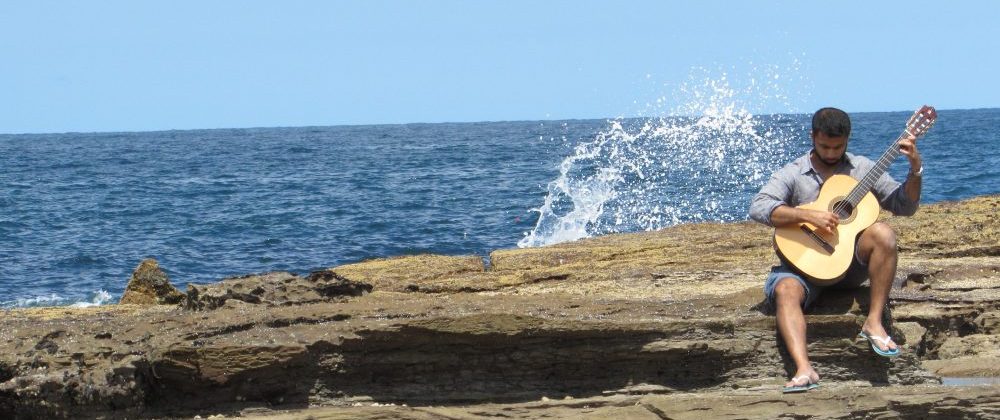Yesterday I went over to my old teacher’s place in New Delhi – my first ever teacher, that is, about whom there is much I could say that is laudatory – and met a couple of his (other) proteges. These guys aren’t just students, really, in that they are fluent guitarists in their own right, teachers, and have on their own plate the rather consequential gaggle of pieces that will make up their LTCL programs sometime next year. It was great to meet other guitarists – in a western classical landscape that is as sparse as the hinterlands of India in which I’ve been wandering, one often slips in to a feeling that is part loneliness, part lethargy. Meeting other guys and talking music provided a welcome reminder of and refocusing on the point of it all. There were a couple of things we talked about that got me thinking about la vie musicale, which I thought I’ share here as well.
Be a musician, as well as a particular instrumentalist. I, of course, approach this as a guitarist, so that’s the context in which I’ll write – but this applies to any musician, really. Especially outside the European and American context, but all over the world latterly, the pedagogy available to music students is closer to instrumental and technical training than to an education in music. In an art/discipline/profession/industry/trade (all of the above!) that trades in expression and whose currency is emotional response, it is important for the producers to understand what they’re making, and why. It will help them market and sell, but since production in this context is dependent on the modulation of skill, it will also help them produce. The cultural context of a piece, the oeuvre from which it hails, or even its genre of music are important informants of how it is played, what it means etc. For example, and I realize this may invite musicological brick-bats: does anybody else out there find that Bach has written a few ‘wrong’ notes into his works, which when presented prominently, contribute to the reasons why his compositions are considered a cut above their contemporaries? The man had humor, and even in his work, he enjoyed co-opting his colleagues to lead an audience up the garden path (that would be you, performing Bach – yes, you are his partner in this production). Your possible contentions on my example aside, my request is this – get in to the music you play! A piece is not just a piece, just as a flower in your hair isn’t just a bit of chopped veggie that got stuck up there.
Purpose is important. IMHO, it is important to always be working (musically speaking) towards something. A performance. A new program (for later performance). A new piece (for cocktail evenings, or other places you’d show your friends). A competition. A recording project. An exam. Guiding your students further down the road to proficiency, whatever their objectives. It’s also important to line up a bunch of them in series. Even when one is occasionally stirred to action, it’s easy enough to crest one objective, and then fall in to indolence. I think of this as unfortunate, because a) it’s a shame to sound wonderful and do nothing with it, and b) if you’re worried about not sounding good enough, there is nothing like a setting a bar to help you soar past it. There are, of course, also meditative, introspective, deeply personal practitioners of music, who play much like yogis stand on their heads or float up in thin air when nobody’s looking – if you fall into that category, I don’t mean you. I hope the balance of your personal economics allows you the luxury of music for your own purposes; if it does, I congratulate you. If it doesn’t, but you find yourself irresistibly drawn to its making, I suggest you explore ways to locate the targets you set yourself outside your own mind. It will likely help with the economic situation, and you might just make other people happy en route.
Don’t over-think it. This is especially true for people aiming for virtuosity. I myself am only just a striving upstart, so I’ll own that I don’t speak from experience – but I do say this on the strength of long observation, and extensive experience on the other end of things, that is, as a deeply-engaged listener. When one is trying to get that tremolo to move faster, passage to sound even sweeter, louder, better etc, it’s important to remember that music is a picture you paint on silence. Usually when you play (particularly as a classical soloist), there is no sound but that which you make. Assuming you know your notes and are not deficient in your technical ability – don’t sweat it so much. Relax. Slow down. Get softer. Listen to yourself – if what you’re saying/playing is important, surely it bears your hearing it too. See what effect the passage or piece has on you, as much as the effect you have on it. Make peace with it being what it is, no more, and no less. Be conscious of what you’re saying, and get behind it. Then fill your silence with it. Say it.

